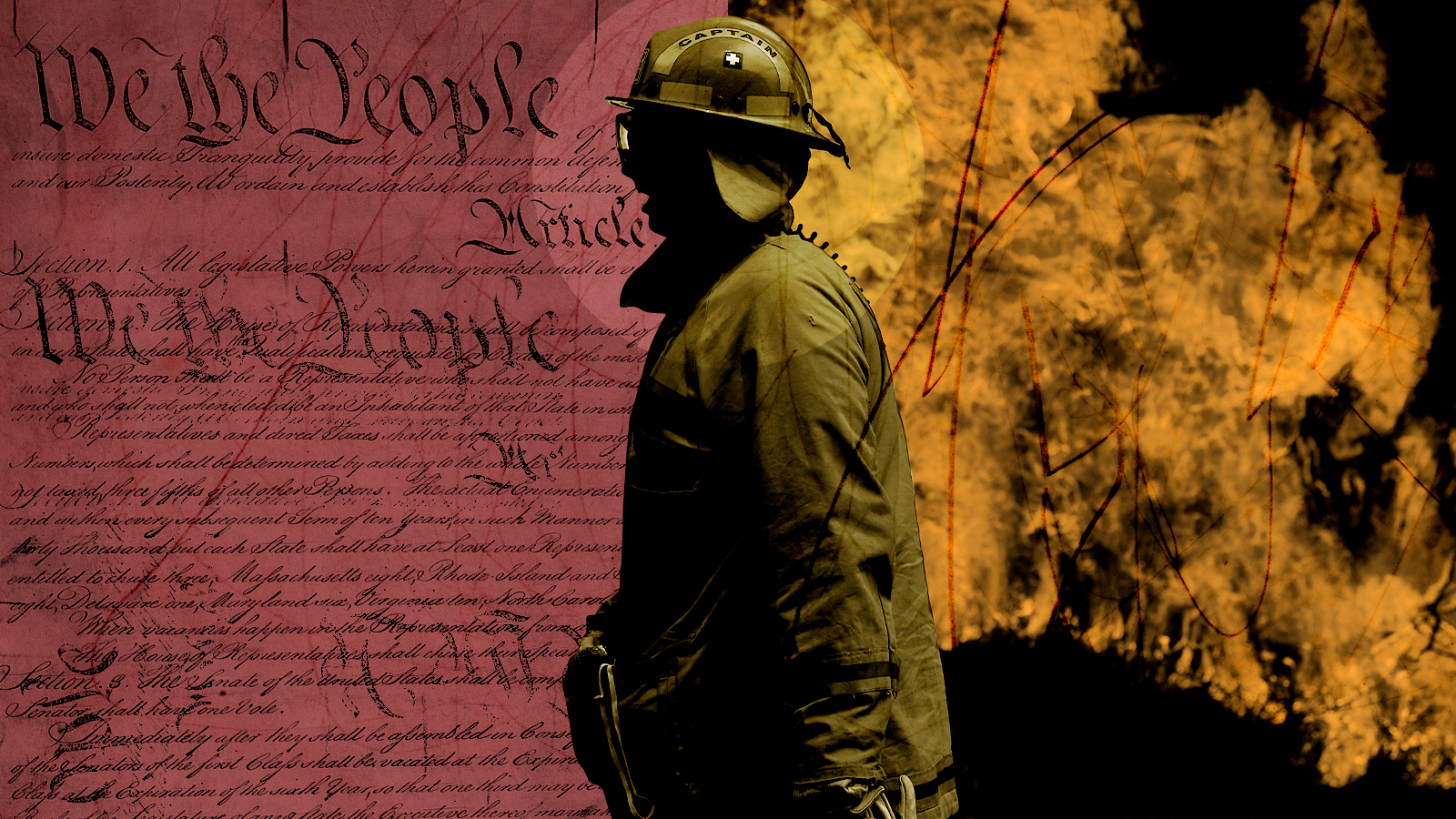American government is heading for a climate-induced legitimacy crisis
Revolutions happen when a political system fails to address huge, obvious problems


A free daily email with the biggest news stories of the day – and the best features from TheWeek.com
You are now subscribed
Your newsletter sign-up was successful
The Intergovernmental Panel on Climate Change, probably the largest scientific collaboration in human history, has produced its Sixth Assessment Report on climate change. The science is complicated and the pile of evidence is immense, but the basic conclusion is fairly straightforward: Scientists are ever more certain that the global temperature is rising, that it is caused by humans, and that all manner of extreme weather events are connected to this warming. As a pseudonymous physicist summarized, "It's real, it's us, there's strong agreement amongst relevant experts, the impacts could be really severe, we can still do things to limit the impact."
The threat is dire. Every part of the United States will be harmed by unchecked global warming — some are getting hit worse than others, but nowhere is immune — while poorer countries will have it worse still. With just one degree Celsius of warming, America has experienced a summer of rolling climate disasters. At 1.5 degrees and beyond, the damage will be much, much worse.
And yet there is no sign that the American political system is taking this threat at all seriously. It raises the question of whether climate change will be the thing that finally topples the already creaking American constitutional system.
The Week
Escape your echo chamber. Get the facts behind the news, plus analysis from multiple perspectives.

Sign up for The Week's Free Newsletters
From our morning news briefing to a weekly Good News Newsletter, get the best of The Week delivered directly to your inbox.
From our morning news briefing to a weekly Good News Newsletter, get the best of The Week delivered directly to your inbox.
In Washington, nearly the whole summer has been eaten up with negotiations around a bipartisan infrastructure that includes little climate policy. Democrats are hoping to pass a separate reconciliation bill with about $3.5 trillion in additional spending over 10 years (or roughly 1 percent of GDP, a modest bill), but even if that was entirely climate stuff (only a small part is), it is maybe a fifth the size of what a serious attack on climate change would be.
Progress is being made, but it just is not anywhere near the scale of the problem. Then, because Democrats will likely lose control of the House of Representatives at least next year, and Republicans don't believe in doing anything about the climate problem, that will probably be it for climate policy for the rest of the decade, if not longer. If conservatives succeed in their plot to destroy fair elections at all levels of government and set up one-party rule, that will be it for the indefinite future.
Traditionally, when a government fails to address a giant, looming threat, it raises the chance of revolution. Now, such an event is quite scary, and both conservative and moderate forces have spent generations whipping up fear of Jacobins and guillotines. This leads to a common misconception, though — that revolutions are the result of people deciding to overthrow the government. As listeners of historian Mike Duncan's excellent Revolutions podcast can tell you, this gets the causality (mostly) backwards. Actions from revolutionaries of course do matter, but the primary causal factor in virtually every revolution in history has been the rottenness and incompetence of the status quo political regime. If a government can ensure a modicum of economic prosperity and keep a solid grip on the armed forces, revolutions almost never have a chance.
For instance, by the end of his reign, Tsar Nicholas II's record of constant failure was so appalling that nearly the entire Russian political spectrum, from communists to ultra-conservative monarchists, was united against him. His horrifying misrule convinced even die-hard autocrats that the country could not survive with an incompetent dolt at the apex of power.
A free daily email with the biggest news stories of the day – and the best features from TheWeek.com
Economist John Kenneth Galbraith made a similar observation about the failure of the elite in Ancien Régime France to head off revolution:
In 1774 [Turgot] became comptroller-general of France, and his immediate task was to curb the expenditures of the French court. He failed. A firm rule operated against him: People of privilege almost always prefer to risk … total destruction rather than surrender any part of their privileges. Intellectual myopia, often called stupidity, is a reason. There's also the invariable feeling that privilege, however egregious, is a basic right. The sensitivity of the poor to injustice is a small thing as compared with that of the rich. And so it was in the Ancien Régime … when reform from above became impossible, then revolution from below became inevitable. [The Age of Uncertainty]
It follows that if one fears revolution, then by far the most important thing to do is to make the extant political system function. This was one of Franklin Roosevelt's main motivations for the New Deal — as historian Eric Rauchway writes in his book Winter War, FDR worried that if the Great Depression was not cured somehow, then either fascists or communists might topple the government. "The millions who are in want will not stand by silently forever while the things to satisfy their needs are within easy reach," he said in a 1932 campaign speech.
Now, I would be a fool to predict that a revolution is definitely going to happen, much less when. But it's also impossible to deny that Galbraith's scheme could be plausibly applied to America's total failure to pursue climate policy at anything like a reasonable scale. The Democratic Party is not pursing vigorous climate policy because America's archaic constitutional system was deliberately designed to make it nearly impossible to do anything, and because doing so would infuriate a lot of well-heeled interest groups the party is in bed with. Republicans, meanwhile, are doing their absolute utmost to increase greenhouse gas emissions and make everything worse.
Like most people, I suspect, I find it very hard to imagine conditions getting so bad in the U.S. that people rise up and overthrow the basic structure of government. But I also suspect that few have really reckoned with how the coming years are going to inflame unrest and discredit the status quo.
Climate disasters are regularly hammering almost every state. California is suffering its second-largest wildfire in recorded history (and the record was set just last year), and its reservoirs are nearly out of water. Something like 40 percent of the country is in serious drought conditions, yet again. It's gotten bad enough that major stories fly under the radar — for instance, I wasn't aware of the flooding in Omaha a few days ago until I started writing this article.
And all that is just a tiny taste of what Americans are going to experience over coming decades. When people are suffering horribly and their government is doing little to help them, it tends to fuel radicalization and extremism (like eco-terrorism). Revolution is a frightening prospect, to be sure — I would not be that confident that a better government would be the result, instead of chaos and war. But if the American elite make that the only option available to have a prayer of saving the planet, some may decide it's a chance worth taking.
Ryan Cooper is a national correspondent at TheWeek.com. His work has appeared in the Washington Monthly, The New Republic, and the Washington Post.
-
 Local elections 2026: where are they and who is expected to win?
Local elections 2026: where are they and who is expected to win?The Explainer Labour is braced for heavy losses and U-turn on postponing some council elections hasn’t helped the party’s prospects
-
 6 of the world’s most accessible destinations
6 of the world’s most accessible destinationsThe Week Recommends Experience all of Berlin, Singapore and Sydney
-
 How the FCC’s ‘equal time’ rule works
How the FCC’s ‘equal time’ rule worksIn the Spotlight The law is at the heart of the Colbert-CBS conflict
-
 ‘The forces he united still shape the Democratic Party’
‘The forces he united still shape the Democratic Party’Instant Opinion Opinion, comment and editorials of the day
-
 ‘Those rights don’t exist to protect criminals’
‘Those rights don’t exist to protect criminals’Instant Opinion Opinion, comment and editorials of the day
-
 Trump’s EPA kills legal basis for federal climate policy
Trump’s EPA kills legal basis for federal climate policySpeed Read The government’s authority to regulate several planet-warming pollutants has been repealed
-
 ‘The mark’s significance is psychological, if that’
‘The mark’s significance is psychological, if that’Instant Opinion Opinion, comment and editorials of the day
-
 ‘The West needs people’
‘The West needs people’Instant Opinion Opinion, comment and editorials of the day
-
 ‘The censorious effect is the same, even if deployed covertly’
‘The censorious effect is the same, even if deployed covertly’Instant Opinion Opinion, comment and editorials of the day
-
 Vietnam’s ‘balancing act’ with the US, China and Europe
Vietnam’s ‘balancing act’ with the US, China and EuropeIn the Spotlight Despite decades of ‘steadily improving relations’, Hanoi is still ‘deeply suspicious’ of the US as it tries to ‘diversify’ its options
-
 ‘The sport is still run on a shoestring’
‘The sport is still run on a shoestring’Instant Opinion Opinion, comment and editorials of the day
